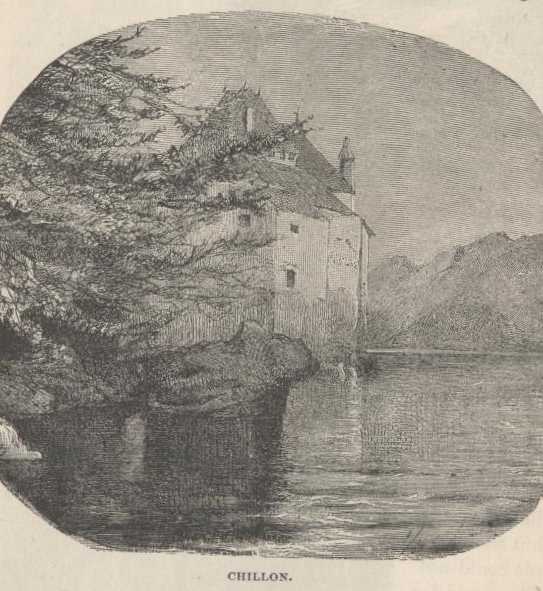I had always had a deep and reverent compassion for the sufferings of the "prisoner of Chillon," whose story Byron had told in such moving verse; so I took the steamer and made pilgrimage to the dungeons of the Castle of Chillon, to see the place where poor Bonnivard endured his dreary captivity three hundred years ago. I am glad I did that, for it took away some of the pain I was feeling on the prisoner's account. His dungeon was a nice, cool, roomy place, and I cannot see why he should have been dissatisfied with it. If he had been imprisoned in a St. Nicholas private dwelling, where the fertilizer prevails, and the goat sleeps with the guest, and the chickens roost on him and the cow comes in and bothers him when he wants to muse, it would have been another matter altogether; but he surely could not have had a very cheerless time of it in that pretty dungeon. It has romantic window-slits that let in generous bars of light, and it has tall, noble columns, carved apparently from the living rock; and what is more, they are written all over with thousands of names; some of them—like Byron's and Victor Hugo's—of the first celebrity. Why didn't he amuse himself reading these names? Then there are the couriers and tourists—swarms of them every day—what was to hinder him from having a good time with them? I think Bonnivard's sufferings have been overrated.

From page 263 The Life of Mark Twain - The Middle Years 1871-1891:
After resting two days, Sam led the group on a thirty-mile steamer excursion to the chateau of Chillon at the eastern end of the lake. The island castle had been made famous by Lord Byron's narrative poem ‘The Prisoner of Chillon (1816), which dramatized the travail of Francois Bonnivard, the Genevois patriot jailed there. But Sam regarded it as a “humbug,” nothing more than a tourist trap built “around the living rock to fit Byron’s poem. This dungeon is much cleaner & pleasanter than Visp or any of those places.” Sam repeated much the same point in his travelogue. His “pilgrimage” to “the place where poor Bonnivard endured his dreary captivity three hundred years ago” relieved him of “some of the pain I was feeling on the prisoner's account.” The “dungeon was a nice, cool, roomy place, and I cannot see why he should have been dissatisfied with it.” It was, after all, a more suitable lodging than “a St. Nicholas private dwelling, where the fertilizer prevails, and the goat sleeps with the guest, and the chickens roost on him and the cow comes in and bothers him.” Sam betrayed in such passages his unrelenting bias against Catholicism. He repeatedly contrasted the “poverty and dirt and squalor” he encountered in the Catholic cantons of central Switzerland with the relative cleanliness of the Protestant cantons. Even the “Protestant glaciers,” he averred, had nary a speck of dirt on them because they were routinely whitewashed.”